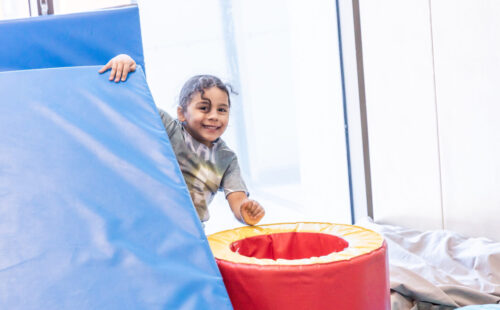Spending time outside is not only fun, it’s vital to our health and development. At St. David’s Center we focus on building relationships that nurture the development of every child and family. Being outside is one of the best ways to nurture people of all ages. Any amount of time outside is beneficial, but aiming for 30 minutes a day is a great way to get in the habit.
Being outdoors is important for families because it:
- Decreases stress in children and adults, allowing family members to positively connect.
- Connects family to community.
- Encourages love and respect of nature.
- Leads to better mental health outcomes for adults and children.
- Improves immune system functioning.
Being outdoors is important for children’s development because it:
- Increases children’s attention skills.
- Increases impulse control.
- Increases cognitive functioning.
- Is multi-sensory and meets many sensory needs.
- Decreases illness and obesity.
- Decreases ADHD symptoms.
- Decreases rates of depression.
- Leads to greater resilience in response to stressful life events.
- Leads to people being more generous.
Plus, the outdoors can “hold” more physical play:
- Children can be louder and move more.
- Children have fewer obstacles to bump into or break.
Being outdoors increases Vitamin D levels and decreases levels of cortisol (the stress hormone). Play in general leads to changes at the molecular (epigenetic), cellular (neuronal connectivity), and behavioral levels (e.g., socioemotional and executive functioning skills), which promotes learning and prosocial behavior. Physical play, for example, causes the body to release brain-derived neurotrophic factor (BDNF) that encourages neuron growth. Being curious, a common element in play, results in enhanced brain activity.
In addition to the biological reasons, research has shown that at the behavioral level, children who play outdoors more have better health outcomes. In addition, there is research that an increase in the amount of recess at school is associated with higher test scores.
Because the outdoors provide sight, sound, smell, and tactile experiences that are plentiful but not overwhelming, it promotes sensory integration. Try closing your eyes and identifying each sound you hear as an example of how rich the outdoors can be. Occasionally there may be loud sounds such as thunder that can be overwhelming, but in general the sensory experiences are manageable for most children.
Nature is dynamic, so children stay motivated. In the fall, for example, there is a plethora of leaves to play with, but at the same time, each leaf is different. Unlike factory-made toys that are identical, children can always find leaves or sticks that are different from the ones they’ve already found. This novelty keeps children motivated to play for longer. At the same time, nature doesn’t get bored either. A child can play chase with the waves on a beach as long as they want. The ocean, unlike parents, never gets tired of the game.
Click here to learn more about our Early Childhood Education Program.
 Mike Huber, MAEd is the Curriculum Specialist for Early Childhood Education at St. David’s Center. He is the author of Inclusion Includes Us: Building Bridges and Removing Barriers in Early Childhood(Redleaf Press 2022) and Embracing Rough and Tumble Play: Teaching with the Body in Mind (Redleaf Press, 2016), as well as six picture books including The Amazing Erik (Redleaf Lane, 2014). He is the co-host of the podcast, Teaching with the Body in Mind, and a frequent guest on That Early Childhood Nerd.
Mike Huber, MAEd is the Curriculum Specialist for Early Childhood Education at St. David’s Center. He is the author of Inclusion Includes Us: Building Bridges and Removing Barriers in Early Childhood(Redleaf Press 2022) and Embracing Rough and Tumble Play: Teaching with the Body in Mind (Redleaf Press, 2016), as well as six picture books including The Amazing Erik (Redleaf Lane, 2014). He is the co-host of the podcast, Teaching with the Body in Mind, and a frequent guest on That Early Childhood Nerd.
